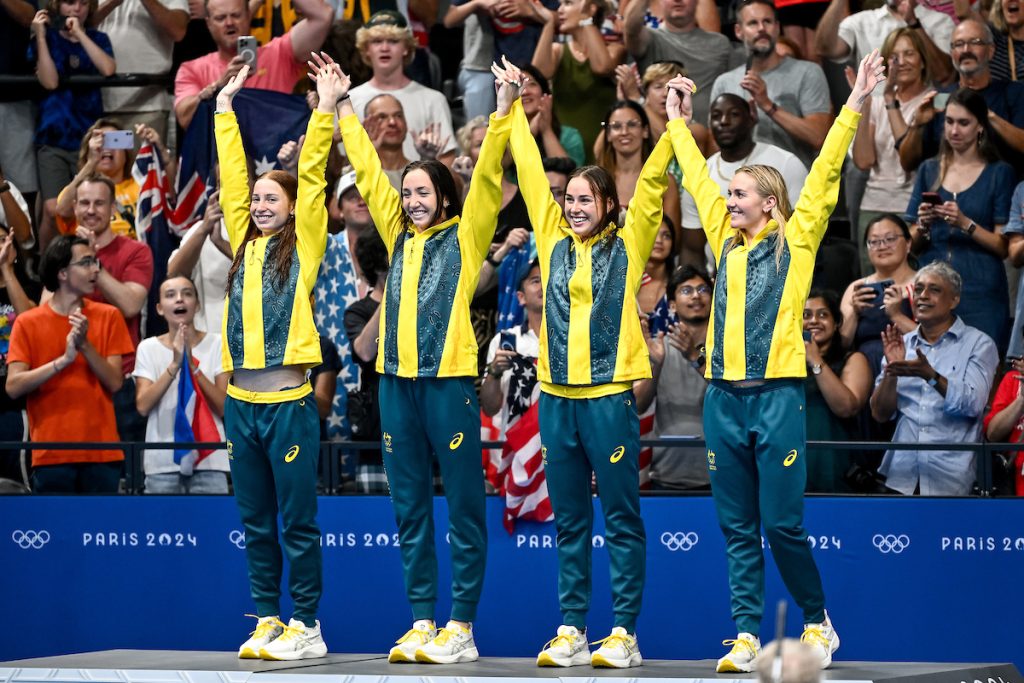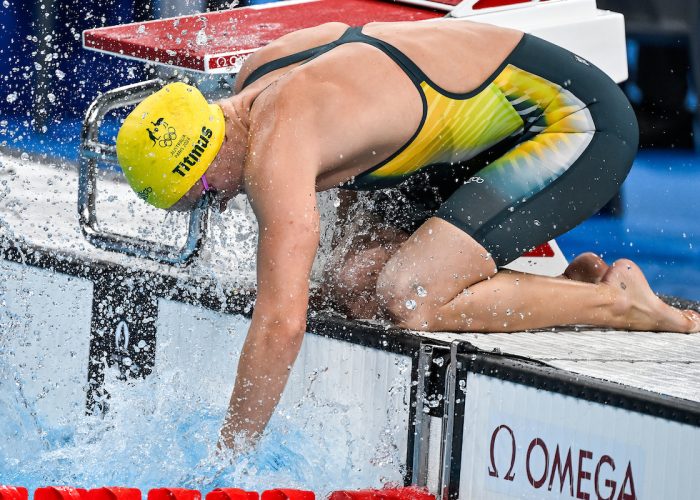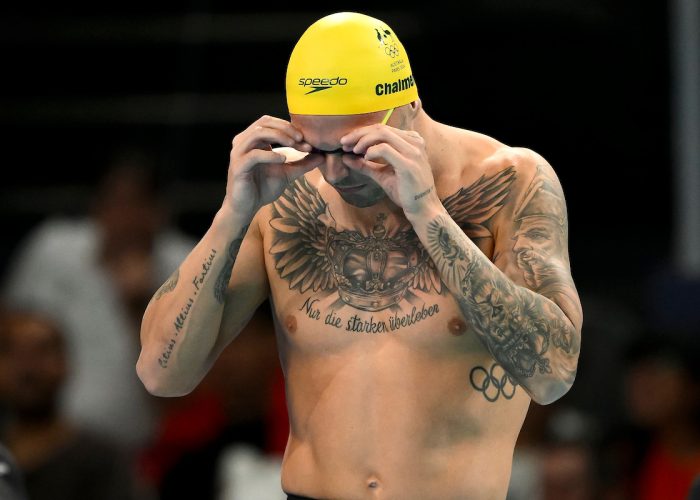Australia Left Olympic Games Riding Momentum into Next Quad; Female Freestyle Relay Power on Display

Australia Left Paris Games Riding Momentum into Next Quad; Female Freestyle Relay Power on Display
For eight days at the Paris La Défense Arena, the Australian Swim Team scared the life out of the Olympic gold medal tally and its longtime custodian, archrivals the USA.
The Aussie Dolphins came into the City Of Lights in pursuit of swimming’s holy grail – that much sought after and time-honored quest of Olympic gold medal supremacy.
Australia got off to a flyer on the opening night with a command performance from its diva, the face of the Aussie team, Ariarne Titmus, who defended the long-awaited Race of the Century crown – the 400-meter freestyle.
There was another history-making effort from its all-conquering women’s 400 freestyle relay, Olympic domination personified for a fourth straight victory.
But after a slow start the U.S. produced a barnstorming, world-record-breaking finale with double gold on the final night to maintain that supremacy. The effort elevated its gold medal haul to eight and its overall medal tally to 28 (8-13-7).
The Aussies went down by one gold, winning seven titles for a total of 18 (7-8-3) and spearheaded by a women’s team that won eight individual medals (four gold, three silver and one bronze) and two gold and one silver in the battle of the relays.
Australian head coach Rohan Taylor knows the battlelines are always drawn and that the world around them is not standing still with superstars Leon Marchand (four) and Summer McIntosh (three), winning seven individual gold medals between them for France and Canada.
“Australia ended up one gold short of equaling the U.S.,” Taylor said of a team he was super proud of. “We all know the narrative around that, but we do see the U.S. as the standard-bearers and, for us, we just want to be as close as we can to that. I think we showed that we were again competitive.”
Australia’s Paris swimming campaign sat in the golden hands of a female juggernaut led by Tokyo heroines Kaylee McKeown and Titmus, and Emma McKeon swimming in her third and last Games. Rising stars Mollie O’Callaghan and Meg Harris powered the way, too.
Five women with four very different stories who individually and together added that Midas touch for a swimming-mad country that had tasted gold in Paris before – in 1900 and again in 1924. Them, it was pioneers like Freddie Lane and Andrew “Boy” Charlton who wrote those early chapters that are indelibly inked in Australia’s swimming annals.
The Aussie women meant business and McKeown, the bespectacled backstroking ace from Southeast Queensland (Australia’s little slice of swimming heaven) kept her rival, American Regan Smith, at bay to swim her way into Olympic folklore. By defending her 100 and 200 backstroke double from Tokyo, McKeown became the first female backstroker to win the double-double.

Kaylee Mckeown of Australia celebrates after competing in the swimming 100m Backstroke Women Final during the Paris 2024 Olympic Games at La Defense Arena in Paris (France), July 30, 2024. Kaylee Mckeown placed first winning the gold medal.
McKeown, at 23, arrived in Paris with that steely look in her eyes, a confidence driven after leaving no stone unturned in her arduous and meticulous training routine masterminded by coach Michael Bohl at the Gold Coast Aquatic Centre.
Her ability to put herself in a position to push the accelerator at the precise time had given her that golden edge, the difference between gold and silver. And she left the Olympic city in a blaze of glory, with the honor of carrying the Australian flag into the Stade de France for a spectacular Closing Ceremony alongside Aussie yachtsman Matt Wearn, who also won back-to-back gold in the dinghy class competition in Marseille.
McKeown joined previous swimmers, Olympic legends Dawn Fraser (1964), Mike Wenden (1968), Kieren Perkins (1992), Ian Thorpe (2000), Petria Thomas (2004) and Stephanie Rice (2008) as the Aussie flag-bearer.
Titmus started out at full throttle, putting her pedal to the metal on the opening night to crush the hopes of Canada’s rising star McIntosh and the greatest of all-time from the U.S., Katie Ledecky, in a 400 freestyle title fight that had three contenders all in the same ring – all current and former world record holders – and a proud defender.
For Titmus, it was a successful and rare golden defense of the coveted 400 freestyle crown, retained in 3:57.48, leading all the way from McIntosh (3:58.37) and Ledecky (4:00.26).
The former Tasmanian, who has called Southeast Queensland her home for the best part of the last decade, gave the Dolphins the start they needed, a confidence booster for her and an Australian team ready to rumble.
“It’s one thing to come into an Olympics like last time (in Tokyo) not being an Olympic gold medalist and it’s another thing to come in and (have to) defend your title,” Titmus said. “It’s a big monkey on your back and there was a lot of expectation on me and I definitely felt it this week more than ever.
“But I actually felt pretty relaxed today which was nice…I just wanted to come out and have fun. The crowd here is electric. It’s about getting your hand on the wall first – it’s not about swimming as fast as you can….(the time was) a bit off my best but being a back-to-back Olympic champion is pretty cool and it’s nice to have that monkey off my back now.”

Ariarne Titmus of Australia prepares to compete in the swimming 400m Freestyle Women Heats during the Paris 2024 Olympic Games at La Defense Arena in Paris (France), July 27, 2024.
The opening night was like no other, Titmus becoming the second Australian female swimmer to defend an Olympic title since the great Dawn Fraser won the second of her three 100 freestyle golds in Rome in 1960, after claiming gold in Melbourne in 1956. She added a third in Tokyo in 1964.
Later in the night, Australia’s relay team of Mollie O’Callaghan (52.24), Shayna Jack (52.35), Emma McKeon (52.39) and Meg Harris (51.94) continued the reign of Australia’s 400 freestyle dynasty, completing a four-peat in a new Olympic record of 3:28.92. The domination started in London in 2012, went down to Rio in 2016, surfaced in Tokyo for 2020 and burst back to life again in Paris 2024.
It was the first Australian Olympic team or relay to win four straight, with a sixth Olympic gold medal for the retiring McKeon that took her past the great Ian Thorpe, with five earned between Sydney and Athens.
Two nights later, Titmus was back on center stage, this time alongside O’Callaghan — two Australian women primed for a rematch after Titmus took back her world record from O’Callaghan at the Australian Trials. This time, O’Callaghan emerged from a titanic 200 freestyle duel with Titmus as Queensland’s latest Olympic champion.
O’Callaghan produced a barnstorming final 50 meters to break the Olympic record of 1:53.50 set by Titmus in Tokyo three years ago and to win her first individual gold in her first individual final, clocking 1:53.27 with her training partner half a second behind in 1:53.81.
It was a special duel. The women from the same St. Peters Western Swim Club. The same coach in Dean Boxall. The two fastest girls in the world.
The pair became the fifth Australian women’s duo to take an Olympic quinella in the pool, joining Fanny Durack and Mina Wylie (100 freestyle; Stockholm, 1912); Dawn Fraser and Lorraine Crapp (100 freestyle; Melbourne, 1966), that pair reversing result in the 400 freestyle; and Susie O’Neill and Petria Thomas (200m butterfly; Atlanta, 1996).
O’Callaghan created another special slice of history. It was not only her first individual Olympic gold medal, but the 100th swimming medal by an Australian female, since the trailblazers Durack and Wylie in 1912.
Night Four was reserved for McKeown, who delivered her first golden moment with a stunning defense of her Tokyo Olympic 100 backstroke crown. Becoming only the second swimmer since the event’s inclusion in the Games in 1928 to go back-to-back, McKeown followed American star Natalie Coughlin, who won in 2004 and 2008.
McKeown timed her race to absolute perfection. Fourth at the turn behind Canadian Kylie Masse and the U.S. pair, world record holder Smith and Katharine Berkoff, the Aussie powered off the wall and with 20 meters to swim, edged ahead her major opponents and was never headed. The U.S. women tried to hang on, but McKeown found something in her Olympic champion bag and successfully defended her crown to break her own Olympic record in a time of 57.33 (28.08/29.25), equaling her personal best.
“The American girls gave me a red-hot push, but I like to think I have a little ‘super power’ and that’s my dad and I believe he was with me tonight….” McKeown said. “Dad would be extremely proud…and it’s also great to have my family here, because I know he’s here with us in spirit….”
McKeown also booked her place in swimming’s annals in an Olympic record time of 2:03.73 in the 200 backstroke (breaking American Missy Franklin’s 2012 time from London) to become Australia’s greatest ever individual gold medalist, with four golds after completing the back double.

Kyle Chalmers of Australia prepares to compete in the swimming 100m Freestyle Men Semifinals during the Paris 2024 Olympic Games at La Defense Arena in Paris (France), July 30, 2024.
Kyle Chalmers claimed a third medal from three consecutive Olympic 100 freestyle finals – beaten by Chinese young gun Pan Zhanle, who he had inspired as an 11-year-old. Pan obliterated the world record on his way to the gold, stopping the clock at a sizzling 46.40 – 0.40 inside his own previous world mark – and the first world record of the meet.
While Pan swam away with China’s first gold medal in the event, Chalmers powered home for the silver in 47.48, former world record holder David Popovici taking bronze in 47.49.
Chalmers had been forced to switch coaches and States earlier this year, leaving his beloved South Australia and setting up a new training base on Queensland’s Sunshine Coast under close friend Ashley Delaney at St. Andrews.
“And to be on the podium for three consecutive times is something I’m going to be very, very proud of and something no one can ever take away from me,” said Chalmers.
Chalmers joined an exclusive club with two 100 freestyle legends in Russia’s Alex Popov and Duke Kahanamoku (USA) to medal in three consecutive finals of swimming’s blue ribband event.
In the men’s 50m freestyle final, Australia held its collective breath for 21.25 seconds in the early hours of a Saturday morning as Cam McEvoy celebrated a record fourth Games with gold.
A self-made, new-age sprinter, McEvoy and his coach Tim Lane from Somerville House, claimed Australia’s first ever medal in the helter-skelter 50 freestyle final.
“It’s amazing to win and that entire 21.25 seconds was bliss,” McEvoy said. “The way my stroke moved through the water. I never thought I’d ever be able to experience that. The joy of the moment I just had and to get a gold medal with it…. it’s unreal.”

- EVENT PAGE
- SCHEDULE
- VENUE
- STREAMING INFO
- DAY 1 PRELIMS RESULTS
- DAY 1 FINALS RESULTS
- DAY 2 PRELIMS RESULTS
- DAY 2 FINALS RESULTS
- DAY 3 PRELIMS RESULTS
- DAY 3 FINALS RESULTS
- DAY 4 PRELIMS RESULTS
- DAY 4 FINALS RESULTS
- DAY 5 PRELIMS RESULTS
- DAY 5 FINALS RESULTS
- DAY 6 PRELIMS RESULTS
- DAY 6 FINALS RESULTS
- DAY 7 PRELIMS RESULTS
- DAY 7 FINALS RESULTS
- DAY 8 PRELIMS RESULTS
- DAY 8 FINALS RESULTS
- DAY 9 FINALS RESULTS




This is an unusual tone from Ian… and quite patronising. Diva or bespectacled??? Out of all the adjectives that we could chose to describe our strong and inspiring athletes? And why are we referring to 50m as helter-skelter? That makes it seem chaotic when it is a precision event (as Cam himself explains over and over… no margin for error).
The piece was quite flattering to the Australian performances. I believe you are reading too much into some of the descriptors. Bespectacled was used because Kaylee is known for the look she wears on the podium. More, Ian referred to her as a heroine and ace, two terms that pay tribute. In terms of helter-skelter, that reference is to the nature of a 50-meter race being routinely tight, moreso than others.
Thanks for the reply John. I thought that Ian works (or used to) in communications for Swimming Australia so I would expect any article of his to be flattering to Australia – and you are right, maybe I am reading too much into the words used; however words do matter. Diva, when used to describe someone other than an opera singer, refers to someone difficult to work with. Bespectacled is commenting on what someone looks like rather than their ability. And helter-skelter has been used by this site a number of times to refer to 50 free – and again, typically is used to mean disordered, confused or chaotic.
Appreciate your feedback. All the best.
Great article. No issues with the wording! It was our 3rd best ever Olympic swimming meet. The US barely squeaking a victory by a solitary Gold! Overall the swimmers helped the nation to our greatest Overall success with a record 18 Golds and 5th place on the Table.